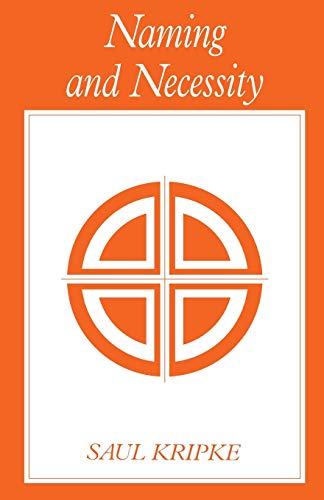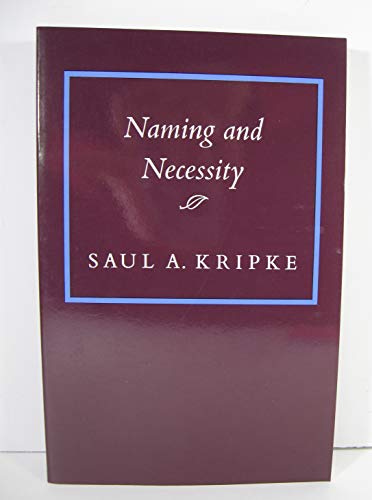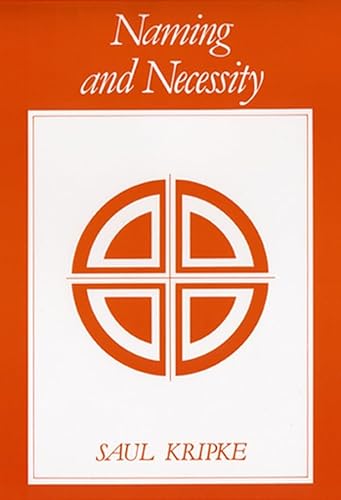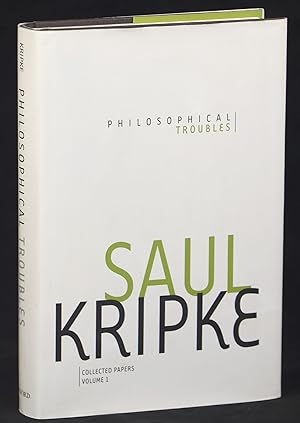saul kripke naming and necessity (44 Ergebnisse)
FeedbackSuchfilter
Produktart
- Alle Product Types
- Bücher (44)
- Magazine & Zeitschriften (Keine weiteren Ergebnisse entsprechen dieser Verfeinerung)
- Comics (Keine weiteren Ergebnisse entsprechen dieser Verfeinerung)
- Noten (Keine weiteren Ergebnisse entsprechen dieser Verfeinerung)
- Kunst, Grafik & Poster (Keine weiteren Ergebnisse entsprechen dieser Verfeinerung)
- Fotografien (Keine weiteren Ergebnisse entsprechen dieser Verfeinerung)
- Karten (Keine weiteren Ergebnisse entsprechen dieser Verfeinerung)
- Manuskripte & Papierantiquitäten (Keine weiteren Ergebnisse entsprechen dieser Verfeinerung)
Zustand Mehr dazu
Weitere Eigenschaften
- Erstausgabe (3)
- Signiert (Keine weiteren Ergebnisse entsprechen dieser Verfeinerung)
- Schutzumschlag (5)
- Angebotsfoto (25)
Sprache (4)
Gratisversand
Land des Verkäufers
Verkäuferbewertung
-
EUR 25,28
Währung umrechnenEUR 5,76 für den Versand von Vereinigtes Königreich nach DeutschlandAnzahl: 3 verfügbar
In den WarenkorbZustand: NEW.
-
Identity and Necessity / Identität und Notwendigkeit : Englisch/Deutsch. [Great Papers Philosophie]
Verlag: Reclam Philipp Jun. Nov 2021, 2021
ISBN 10: 3150140056 ISBN 13: 9783150140055
Sprache: Deutsch
Anbieter: AHA-BUCH GmbH, Einbeck, Deutschland
EUR 7,80
Währung umrechnenEUR 2,90 für den Versand innerhalb von/der DeutschlandAnzahl: 1 verfügbar
In den WarenkorbTaschenbuch. Zustand: Neu. Neuware - Die Thesen, die Kripke 1971 in seinem Aufsatz »Identity and Necessity« (und später in seinem Buch »Naming and Necessity«) entwickelte, haben die analytische Philosophie geprägt: Er stellt dort Überlegungen zur Bedeutung von Eigennamen sowie zur Rolle von Eigennamen und Beschreibungen in Identitätsaussagen an und untersucht das Verhältnis von Apriorität in der Erkenntnistheorie und Notwendigkeit in der Metaphysik. Sein Argument gegen die Identitätstheorie in der Philosophie des Geistes ist bis heute einflussreich. Die Neuübersetzung des klassischen Textes wird ausführlich kommentiert, der Verlauf der Argumentation nachgezeichnet und seine Nachwirkungen aufgezeigt.Sprachen: Deutsch, Englisch.
-
Naming and Necessity
Verlag: Harvard University Press (edition 5th Printing), 1980
ISBN 10: 0674598466 ISBN 13: 9780674598461
Sprache: Englisch
Anbieter: BooksRun, Philadelphia, PA, USA
EUR 8,23
Währung umrechnenEUR 6,79 für den Versand von USA nach DeutschlandAnzahl: 1 verfügbar
In den WarenkorbPaperback. Zustand: Fair. 5th Printing. Ship within 24hrs. Satisfaction 100% guaranteed. APO/FPO addresses supported.
-
EUR 20,00
Währung umrechnenKostenlos für den Versand innerhalb von/der DeutschlandAnzahl: 2 verfügbar
In den WarenkorbTaschenbuch. Zustand: Neu. Neuware - Kripkes bahnbrechende Untersuchung Name und Notwendigkeit markiert einen Wendepunkt in der philosophischen Theorie der Eigennamen. In kritischer Auseinandersetzung mit der klassischen Theorie der Eigennamen entwickelt Kripke seine berühmte Alternative: die kausale Namentheorie. Sie besagt, daß der Bezug (die Referenz) eines Namens zunächst in einer Art Taufe festgelegt wird und dann in der Kommunikationsgemeinschaft tradiert wird. Dabei wird die Beschreibung, die bei der Festlegung der Referenz noch eine Rolle gespielt hat, irrelevant, so daß der Name selbst keinen semantischen Sinn hat. Namen sind, im Gegensatz zu Beschreibungen, sogenannte starre Bezeichnungsausdrücke (Designatoren), die, wenn einmal festgelegt, denselben Gegenstand in allen möglichen Welten bezeichnen. Daraus ergibt sich die Verbindung zum zweiten Thema der Untersuchung, der Notwendigkeit.
-
Naming and Necessity (Library of Philosophy & Logic)
Anbieter: WorldofBooks, Goring-By-Sea, WS, Vereinigtes Königreich
EUR 30,30
Währung umrechnenEUR 4,04 für den Versand von Vereinigtes Königreich nach DeutschlandAnzahl: 1 verfügbar
In den WarenkorbHardback. Zustand: Very Good. The book has been read, but is in excellent condition. Pages are intact and not marred by notes or highlighting. The spine remains undamaged.
-
"Naming and Necessity" von Saul A. Kripkes. Eine bedeutende Wende in der Theorie der Eigennamen
Anbieter: AHA-BUCH GmbH, Einbeck, Deutschland
EUR 15,95
Währung umrechnenKostenlos für den Versand innerhalb von/der DeutschlandAnzahl: 1 verfügbar
In den WarenkorbTaschenbuch. Zustand: Neu. Druck auf Anfrage Neuware - Printed after ordering - Essay aus dem Jahr 2005 im Fachbereich Philosophie - Philosophie des 20. Jahrhunderts, Note: 2,0, Technische Universität Berlin (Philosophie), Veranstaltung: Seminar Eigennamen, Sprache: Deutsch, Abstract: Eine bedeutende Wende in der Theorie der Eigennamen wurde durch Saul A. Kripkes 1972 erschienene Vorträge 'Naming and Necessity' eingeleitet. Hierin verwirft er die gesamte bisherige Eigennamentheorie der analytischen Philosophie.Für Kripke stehen Eigennamen zwar für einen Gegenstand, sie haben aber, wie schon zuvor bei Mill, keine Bedeutung. Kripkes Kritik richtet sich somit in erster Linie gegen die Beschreibungs- und Bündeltheorie. Darin wird behauptet, daß der Träger eines Eigennamens derjenige Gegenstand ist, der als einziger die Beschreibungen oder die Mehrzahl aus einem Bündel von Beschreibungen erfüllt, die wir mit dem Namen verbinden. Kripke entwickelt dagegen folgendes Bild: Würde jemand, der mit dem Namen 'Kolumbus' 'der Entdecker Amerikas' verbindet, erfahren, daß ein Normanne Amerika Jahre früher entdeckt hat, den Namen 'Kolumbus' fortan auf diesen Normannen übertragen Sicherlich nicht. Kripke zeigt damit, daß der Gegenstand Träger des Namens bleibt, selbst wenn alle seine Beschreibungen falsch sind. Folglich können die Beschreibungen nicht die Bedeutung eines Eigennamens ausmachen.
-
LA LOGIQUE DES NOMS PROPRES (NAMING AND NECESSITY)
Verlag: Les Editions de Minuit, 1982
ISBN 10: 2707305979 ISBN 13: 9782707305978
Sprache: Französisch
Anbieter: Revaluation Books, Exeter, Vereinigtes Königreich
EUR 34,42
Währung umrechnenEUR 11,53 für den Versand von Vereinigtes Königreich nach DeutschlandAnzahl: 1 verfügbar
In den WarenkorbPaperback. Zustand: Brand New. 176 pages. French language. 8.27x5.35x0.47 inches. In Stock.
-
EUR 17,50
Währung umrechnenEUR 42,46 für den Versand von USA nach DeutschlandAnzahl: 1 verfügbar
In den WarenkorbPaperback. Zustand: Very Good. FIRST THUS. First Edition Thus, Fourth Printing. Not price-clipped. Published by Harvard University Press, 1980. Octavo. Hardcover. Book is very good with light shelf wear, and previous owners name and date on inside cover.100% positive feedback. 30 day money back guarantee. NEXT DAY SHIPPING! Excellent customer service. Please email with any questions. All books packed carefully and ship with free delivery confirmation/tracking. All books come with free bookmarks. Ships from Sag Harbor, New York.
-
EUR 76,99
Währung umrechnenEUR 89,18 für den Versand von USA nach DeutschlandAnzahl: 1 verfügbar
In den WarenkorbHardcover. Zustand: Good. Zustand des Schutzumschlags: Fair. Dust jacket in acceptable condition. Shelf and handling wear to cover and binding, with general signs of previous use. DJ shows scuffing and edgewear. Boards show scuffing. Interior pages clean and unmarked. Secure packaging for safe delivery. 1.01.
-
Naming and Necessity
Verlag: Harvard University Press, Cambridge, MA, 1980
Anbieter: Evening Star Books, ABAA/ILAB, Madison, WI, USA
Erstausgabe
EUR 384,93
Währung umrechnenEUR 38,22 für den Versand von USA nach DeutschlandAnzahl: 1 verfügbar
In den WarenkorbHardcover. Zustand: Near Fine. Zustand des Schutzumschlags: Near Fine. First separate edition. 8vo. [9], 2-172, [4] pp. Full tan cloth, gilt lettering blocked in green with a gold border on each blocking and a leaf stamped in gold on the spine. Green endpapers and pastedowns. Includes a new preface by the author, addenda, and an index. The first separate publication of Kripke's seminal work in metaphysics and in the philosophy of language. The book is drawn from a series of lectures delivered by Kripke at Princeton in 1970, and consists of an examination of a number of philosophical problems including naming and reference, natural kinds, the metaphysical notion of essence, and the nature of necessity. The book has been enormously influential in metaphysics and the philosophy of language and is partly responsible for the reinvigoration of metaphysics within the analytic tradition. A pleasing copy of this landmark work. A name and date on the free front endpaper; light edge wear and a touch of toning to the jacket's spine panel.
-
EUR 40,27
Währung umrechnenKostenlos für den Versand innerhalb von/der DeutschlandAnzahl: 1 verfügbar
In den WarenkorbZustand: New. Saul Kripke is one of the most important philosophers of the twentieth century. His most celebrated work, Naming and Necessity, makes arguably the most important contribution to the philosophy of language and metaphysics in recent years. Asking fu.
-
Naming, Necessity and More
Verlag: Palgrave Macmillan UK, Palgrave Macmillan UK Jan 2014, 2014
ISBN 10: 1349486248 ISBN 13: 9781349486243
Sprache: Englisch
Anbieter: buchversandmimpf2000, Emtmannsberg, BAYE, Deutschland
EUR 53,49
Währung umrechnenEUR 2,49 für den Versand innerhalb von/der DeutschlandAnzahl: 2 verfügbar
In den WarenkorbTaschenbuch. Zustand: Neu. Neuware -Saul Kripke's Naming and Necessity was one of the most influential philosophical works of the twentieth century. In this collection of essays leading specialists explore issues arising from this and other works of Kripke's.Springer Verlag GmbH, Tiergartenstr. 17, 69121 Heidelberg 260 pp. Englisch.
-
Starre Bezeichnungsausdrücke und a posteriorische Notwendigkeiten
Anbieter: AHA-BUCH GmbH, Einbeck, Deutschland
EUR 17,95
Währung umrechnenKostenlos für den Versand innerhalb von/der DeutschlandAnzahl: 1 verfügbar
In den WarenkorbTaschenbuch. Zustand: Neu. Druck auf Anfrage Neuware - Printed after ordering - Studienarbeit aus dem Jahr 2015 im Fachbereich Philosophie - Theoretische (Erkenntnis, Wissenschaft, Logik, Sprache), Note: 1,3, Universität Potsdam, Sprache: Deutsch, Abstract: Der amerikanische Philosoph Saul Aaron Kripke hielt 1970 eine Reihe von drei Vorlesungen, deren Ideen eine kleine Revolution in der Philosophie nach sich zogen. Später entstand aus den Mitschriften dieser Vorlesungen dann das Buch 'Naming and Necessity'. Kripke greift zwei weitestgehend akzeptierte Paradigmen seiner Zeit an. Zum einen ist das die Kennzeichnungstheorie welche sich damit beschäftigt, was Namen eigentlich sind und wie sie mit der Sache zusammenhängen, die sie bezeichnen. Und die zweite bezieht sich auf 'Necessity' also auf den Begriff der Notwendigkeit, hierbei geht es vor allem darum, wie er damit zusammenhängt ob man etwas a priori erkennen kann und ob es notwendige Eigenschaften gibt.In dieser Arbeit werden zunächst die eben erwähnten Theorien, welche sich vor Kripke etabliert hatten genauer dargestellt. Danach wird es um die Kritik gehen welche Kripke daran übt und die Theorie (beziehungsweise das Bild wie er es nennt), welches er alternativ dazu vorschlägt und abschließend wird Kripkes Standpunkt zu Identitätsaussagen, der sich aus seiner restlichen Theorie ergibt, erläutert.
-
Naming, Necessity and More: Explorations in the Philosophical Work of Saul Kripke
Anbieter: moluna, Greven, Deutschland
EUR 64,08
Währung umrechnenKostenlos für den Versand innerhalb von/der DeutschlandAnzahl: Mehr als 20 verfügbar
In den WarenkorbGebunden. Zustand: New. Gilead Bar-Elli, Hebrew University of Jerusalem, Israel Hanoch Ben-Yami, Central European University in Budapest, HungaryMeir Buzaglo, Hebrew University of Jerusalem, IsraelEli Dresner, Tel Aviv University, Israel Paul Horwich, New York University, USASaul .
-
Saul Kripke (Bloomsbury Contemporary American Thinkers).
Anbieter: Kloof Booksellers & Scientia Verlag, Amsterdam, Niederlande
EUR 20,95
Währung umrechnenEUR 5,50 für den Versand von Niederlande nach DeutschlandAnzahl: 1 verfügbar
In den WarenkorbZustand: very good. London : Continuum, 2007. (Library Edition). Hardcover. No dustjacket. 192 pp.(Bloomsbury Contemporary American Thinkers). -Saul Kripke is one of the most important and original post-war analytic philosophers. His work has undeniably had a profound impact on the philosophy of language and the philosophy of mind. Yet his ideas are amongst the most challenging frequently encountered by students of philosophy. In this informative and accessible book, Arif Ahmed provides a clear and thorough account of Kripke's philosophy, his major works and ideas, providing an ideal guide to the important and complex thought of this key philosopher. The book offers a detailed review of his two major works, Naming and Necessity and Wittgenstein on Rules and Private Language, and explores how Kripke's ideas often seem to overturn widely accepted views and even perceptions of common sense. Geared towards the specific requirements of students who need to reach a sound understanding of Kripke's thought, the book provides a cogent and reliable survey of the nature and significance of Kripke's contribution to philosophy. This is the ideal companion to the study of this most influential and challenging of philosophers.English text. Condition : very good. Condition : very good copy. ISBN 9780826492616. Keywords : PHILOSOPHY,
-
EUR 27,40
Währung umrechnenKostenlos für den Versand innerhalb von/der DeutschlandAnzahl: 2 verfügbar
In den WarenkorbTaschenbuch. Zustand: Neu. Neuware - Saul Kripke has been a major influence on analytic philosophy and allied fields for a half-century and more. His early masterpiece, Naming and Necessity, reversed the pattern of two centuries of philosophizing about the necessary and the contingent. Although much of his work remains unpublished, several major essays have now appeared in print, most recently in his long-awaited collection Philosophical Troubles.In this book Kripke's long-time colleague, the logician and philosopher John P. Burgess, offers a thorough and self-contained guide to all of Kripke's published books and his most important philosophical papers, old and new. It also provides an authoritative but non-technical account of Kripke's influential contributions to the study of modal logic and logical paradoxes. Although Kripke has been anything but a system-builder, Burgess expertly uncovers the connections between different parts of his oeuvre. Kripke is shown grappling, often in opposition to existing traditions, with mysteries surrounding the nature of necessity, rule-following, and the conscious mind, as well as with intricate and intriguing puzzles about identity, belief and self-reference. Clearly contextualizing the full range of Kripke's work, Burgess outlines, summarizes and surveys the issues raised by each of the philosopher's major publications.Kripke will be essential reading for anyone interested in the work of one of analytic philosophy's greatest living thinkers.
-
Semantics of Natural Language.
Verlag: D. Reidel Publishing Company, Dordrecht Holland/Boston USA., 1972
Sprache: Englisch
Anbieter: Fundus-Online GbR Borkert Schwarz Zerfaß, Berlin, Deutschland
EUR 25,00
Währung umrechnenEUR 4,99 für den Versand innerhalb von/der DeutschlandAnzahl: 1 verfügbar
In den WarenkorbPp. Zustand: Gut. 2nd Edition. 769 p. Ex Library. With stamps and markings. Good copy with rubbed and slightly soiled binding. The pages are slightly browned but clean. Ex-Libri. Mit Stempeln und Markierungen. Gutes Exemplar mit beriebenem und leicht verschmutztem Einband. Die Seiten sind leicht gebräunt, aber sauber. - PREFACE - - EDITORIAL INTRODUCTION - - CHARLES J. FILLMORE / Subjects, Speakers, and Roles - - GILBERT HARMAN / Deep Structure as Logical Form - - J. A. FODOR / Troubles about Actions - - JOHN ROBERT ROSS / Act - - TERENCE PARSONS / Some Problems Concerning the Logic of Grammatical Modifiers - - RICHARD MONTAGUE / Pragmatics and Intensional Logic - - DAVID LEWIS / General Semantics - - JOHN WALLACE / On the Frame of Reference - - SAUL A. KRIPKE / Naming and Necessity - - KEITH S. DONNELLAN / Proper Names and Identifying Descriptions - - ROBERT C. STALNAKER / Pragmatics - - JAAKKO HINTIKKA / The Semantics of Modal Notions and the Indeterminacy of Ontology - - BARBARA HALL PARTEE / Opacity, Coreference, and Pronouns - - W. V. QUINE / Methodological Reflections on Current Linguistic Theory - - P. F. STRAWSON / Grammar and Philosophy - - LEONARD LINSKY / Analytic/Synthetic and Semantic Theory. Sprache: Englisch Gewicht in Gramm: 250.
-
Name und Notwendigkeit
Verlag: Suhrkamp (1981), Frankfurt a. M., 1981
Anbieter: Expatriate Bookshop of Denmark, Svendborg, Dänemark
Erstausgabe
EUR 43,74
Währung umrechnenEUR 20,50 für den Versand von Dänemark nach DeutschlandAnzahl: 1 verfügbar
In den Warenkorborig.cloth. 1. Auflage. 20x12cm, 192 pp., Translation by Ursula Wulf of 'Naming and Necessity'. Several pages bear inked underlinings. Good., dustwrapper.
-
Philosophical Troubles; Collected Papers, Volume I.
Verlag: Oxford University Press [2011], Oxford, 2011
Anbieter: Evening Star Books, ABAA/ILAB, Madison, WI, USA
Erstausgabe
EUR 240,58
Währung umrechnenEUR 38,22 für den Versand von USA nach DeutschlandAnzahl: 1 verfügbar
In den WarenkorbHardcover. Zustand: Fine. Zustand des Schutzumschlags: Fine. First edition. 8vo. [9], x-xii, [3], 2-388, [6] pp. Black paper boards with silver lettering on the spine. Price of $39.95 on the rear panel of the dust jacket. Composed of published and unpublished articles from the author of Naming and Necessity. These essays touch on a large variety of topics in the analytic tradition.
-
EUR 68,11
Währung umrechnenKostenlos für den Versand innerhalb von/der DeutschlandAnzahl: 3 verfügbar
In den WarenkorbZustand: New. Saul Kripke has been a major influence on analytic philosophy and allied fields for a half-century and more. His early masterpiece, Naming and Necessity, reversed the pattern of two centuries of philosophizing about the necessary and the contingent.
-
The Analytic Tradition in Philosophy, Volume 3 : The Struggle for Modality
Verlag: Princeton University Press Mai 2025, 2025
ISBN 10: 069116004X ISBN 13: 9780691160047
Sprache: Englisch
Anbieter: AHA-BUCH GmbH, Einbeck, Deutschland
EUR 69,58
Währung umrechnenKostenlos für den Versand innerhalb von/der DeutschlandAnzahl: 2 verfügbar
In den WarenkorbBuch. Zustand: Neu. Neuware - An in-depth history of modal logic in analytic philosophy, from a leading philosopher of languageThis is the third of five volumes of a definitive history of analytic philosophy from the invention of modern logic in 1879 to the end of the twentieth century. Scott Soames, a leading philosopher of language and historian of analytic philosophy, provides the fullest and most detailed account of the analytic tradition yet published, one that is unmatched in its chronological range, topics covered, and depth of treatment. Focusing on the major milestones and distinguishing them from detours, Soames gives a seminal account of where the analytic tradition has been and where it appears to be heading. Volume 3 explains the most important achievement in the analytic tradition in the twentieth century-the rise and development of the epistemic and metaphysical modalities of necessity, possibility, and conceivability-and how it opened new vistas for the understanding of mind, meaning, and metaphysics. At the center of the story is Saul Kripke, who generated new modal systems and their open-ended philosophical applications, and his undergraduate teacher, W.V.O. Quine, who rejected the modalities plus our notions of linguistic meaning and reference. Part 1 traces the rise of modal logic from C. I. Lewis's unhappiness with Alfred North Whitehead and Bertrand Russell's Principia Mathematica, through Lewis's modal S-systems, Ruth Marcus's proof-theoretic quantified modal logic, Rudolph Carnap's Meaning and Necessity, and Kripke's logical and philosophical breakthrough. Part 2 chronicles Quine's rejection of meaning, necessity, synonymy, and reference. Part 3 assesses the philosophical framework provided by Kripke's Naming and Necessity, separating its revolutionary insights from its unsolved problems.
-
The New Theory of Reference : Kripke, Marcus, and Its Origins
Verlag: Springer Netherlands, Springer Netherlands, 1999
ISBN 10: 0792355784 ISBN 13: 9780792355786
Sprache: Englisch
Anbieter: AHA-BUCH GmbH, Einbeck, Deutschland
EUR 168,73
Währung umrechnenKostenlos für den Versand innerhalb von/der DeutschlandAnzahl: 1 verfügbar
In den WarenkorbTaschenbuch. Zustand: Neu. Druck auf Anfrage Neuware - Printed after ordering - On January 20th, 22nd, and 29th, 1970 Saul Kripke delivered three lectures at Princeton University. They produced something of a sensation. In the lectures he argued, amongst other things, that many names in ordinary language referred to objects directly rather than by means of associated descriptions; that causal chains from language user to language user were an important mechanism for preserving reference; that there were necessary a posteriori and contingent a priori truths; that identity relations between rigid designators were necessary; and argued, more tentatively, that materialist identity theories in the philosophy of mind were suspect. Interspersed with this was a consider able amount of material on natural kind terms and essentialism. As a result of these lectures and a related 1971 paper, 'Identity and Necessity' (Kripke [1971]), talk of rigid designators, Hesperus and Phosphorus, meter bars, gold and H 0, and suchlike quickly became commonplace in philosophical circles 2 and when the lectures were published under the title Naming and Necessity in the collection The Semantics of Natural Language (Davidson and Harman l [1972]), that volume became the biggest seller in the Reidel (later Kluwer) list. The cluster of theses surrounding the idea that a relation of direct reference 2 exists between names and their referents is now frequently referred to as 'The 3 New Theory of Reference'.
-
The New Theory of Reference : Kripke, Marcus, and Its Origins
Anbieter: AHA-BUCH GmbH, Einbeck, Deutschland
EUR 247,94
Währung umrechnenKostenlos für den Versand innerhalb von/der DeutschlandAnzahl: 2 verfügbar
In den WarenkorbBuch. Zustand: Neu. Neuware - On January 20th, 22nd, and 29th, 1970 Saul Kripke delivered three lectures at Princeton University. They produced something of a sensation. In the lectures he argued, amongst other things, that many names in ordinary language referred to objects directly rather than by means of associated descriptions; that causal chains from language user to language user were an important mechanism for preserving reference; that there were necessary a posteriori and contingent a priori truths; that identity relations between rigid designators were necessary; and argued, more tentatively, that materialist identity theories in the philosophy of mind were suspect. Interspersed with this was a consider able amount of material on natural kind terms and essentialism. As a result of these lectures and a related 1971 paper, 'Identity and Necessity' (Kripke [1971]), talk of rigid designators, Hesperus and Phosphorus, meter bars, gold and H 0, and suchlike quickly became commonplace in philosophical circles 2 and when the lectures were published under the title Naming and Necessity in the collection The Semantics of Natural Language (Davidson and Harman l [1972]), that volume became the biggest seller in the Reidel (later Kluwer) list. The cluster of theses surrounding the idea that a relation of direct reference 2 exists between names and their referents is now frequently referred to as 'The 3 New Theory of Reference'.



![Bild des Verkäufers für Identity and Necessity / Identität und Notwendigkeit : Englisch/Deutsch. [Great Papers Philosophie] zum Verkauf von AHA-BUCH GmbH](https://pictures.abebooks.com/inventory/md/md31903992068.jpg)




















